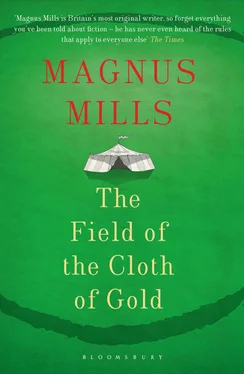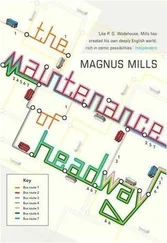During the course of the excavations, an earthwork had been raised along one side of the trench. We’d made a fairly good job of it, packing the earth hard so that it wouldn’t collapse, then crowning it with a layer of turf. The resulting embankment looked formidable, a landmark in its own right, but it was soon to be a source of dissension.
Around mid-afternoon on the fourth day I was toiling alone in the middle section of the trench, making sure that it ran evenly. For various reasons I’d become separated from my co-workers who were further over to the west, but I could still hear occasional snatches of distant conversation. I stopped and listened. Several times in recent days I’d tried to explain to them that talking on the job was a distraction which reduced productivity. Nevertheless, they persisted in chattering whenever my back was turned. I was just about to walk along the trench and reprimand them, when a familiar voice addressed me from directly above. I looked up and saw Brigant standing on the edge, gazing down.
‘I suppose they’re satisfied now, are they?’ he said.
‘Who?’ I enquired.
‘Those people from the camp.’
‘Oh, well,’ I said, ‘yes, they do seem rather pleased with the outcome.’
‘I’m sure they do,’ said Brigant. ‘In fact, they must be delighted. They made it clear from the beginning they wanted to exclude us, and now they’ve built a wall to prove it.’
I leaned on my shovel and stared at him with disbelief.
‘Where’d you get that idea?’ I said. ‘Of course it’s not a wall.’
‘What is it then?’ asked Brigant.
‘It’s for drainage.’
At this moment, a second face loomed into view. It belonged to Hartopp.
‘Looks like a wall to me,’ he said.
‘I’d go further than that,’ proclaimed Brigant. ‘I’d describe it as nothing less than a defensive rampart.’
‘Nonsense,’ I said. ‘It’s for drainage, pure and simple. You know how wet the ground gets in the south-east. That last dose of rainfall was the worst in months. It almost flooded their tents, so they decided to find a remedy.’
‘But we get more rain in the upper field,’ said Brigant.
‘Possibly,’ I replied, ‘but it all drains into the south-east: that’s why the grass is so rich and lush.’
Hartopp peered into the trench.
‘It’s completely dry,’ he said. ‘Who told you it was for drainage?’
‘Nobody, really,’ I said, ‘but it’s obvious it must be.’
‘It’s just as obvious it’s a wall,’ remarked Brigant. ‘A wall of earth.’
Just then, Yadegarian came walking along the trench. When he saw the three of us talking he stopped in his tracks.
‘Everything alright here?’ he asked, eyeing Hartopp and Brigant intently.
All at once I realized he’d never met them before; nor they him.
‘Yes, everything’s fine,’ I said quickly. ‘Yadegarian, may I introduce Hartopp and Brigant? Brigant, Hartopp: this is Yadegarian.’
There followed a polite yet awkward exchange of greetings, after which Hartopp and Brigant retired a short distance.
‘I’ve just come to tell you,’ said Yadegarian, ‘that we’ve reached the end of the string line.’
‘Ah, good,’ I answered. ‘No more digging then?’
‘Just tidying up,’ he said, ‘and then we’ll be finished.’
‘Alright, I’ll be along to have a look in a minute.’
After Yadegarian had gone, I scrambled out of the trench and joined Hartopp and Brigant. They were scrutinizing the embankment with undisguised mistrust, and to some extent I could understand why they felt aggrieved: from where they stood it indeed had the semblance of an imposing wall. At the same time, however, I thought they were both being a little unreasonable. The raised earthwork was an inevitable consequence of the drainage scheme and couldn’t be helped: surely they could see that? As for Brigant’s assertion that it rained more in the upper field, well, frankly, I’d never heard anything so preposterous. Rain was rain as far as I was concerned, and had the same effect everywhere, but Brigant saw it all differently. He seemed to think that hardship and discomfort were the sole preserve of the north; and that such conditions were unheard of in the south, east or west; he was becoming increasingly outspoken on the subject and now, apparently, he’d infected Hartopp with a similar malaise; hence, their concerted criticism of the so-called ‘wall’. Moreover, Brigant gave the impression that he’d been forcibly displaced by the construction work, whereas in truth he’d opted to move northward of his own volition. He evidently regarded the embankment as a kind of personal affront, and I realized I was incapable of changing his outlook.
Before we parted he delivered a final broadside. ‘You’re fortunate you didn’t try to build it any further north,’ he said. ‘Otherwise you’d have run into flinty ground: that would have put a stop to your game.’
‘How do you know what’s in the ground?’ I asked. ‘I’ve never seen you digging.’
‘Believe me,’ said Brigant. ‘I just know.’
Hartopp’s standpoint was equally uncompromising. I’d expected him to view the earthwork through the eyes of an engineer: after all, it was quite an achievement and made a majestic sight as it traversed the Great Field from east to west. In addition, it was perfectly straight, which I hoped would appeal to his geometric inclinations. Instead, though, he judged it to be a gross infringement. In this sense, he shared Brigant’s perspective: as they saw it, they were forever being imposed upon by outsiders, offcomers and interlopers; and the earthwork was merely the most recent example.
Feeling rather disappointed, I left the pair of them nursing their grievances and went back to join my workmates. I’d neglected Yadegarian and the others slightly longer than intended, so I was pleased to find them putting the finishing touches to the job. Standing nearby was Hen. He, too, had been wary of the trench when the work began: he’d assumed the excavations were heading directly into his camp, but once I’d convinced him otherwise he’d observed our progress with friendly detachment. Also, he’d discovered that the cooks shared his affinity with the west: seemingly, there was a certain quality in the daylight which reminded them of their distant homeland. They even talked of settling in the west, if only their employers would allow it. Sadly, this was out of the question.
‘We have to do as we’re told,’ said Yadegarian. ‘Tomorrow we’ll be baking biscuits again.’
Hen mentioned to me privately that he wasn’t sure whether he liked the people in charge of the encampment. In his opinion the cooks were being severely overworked for little or no recompense. Furthermore, there had been absolutely no public consultation when the trench was commissioned: the project had simply started without any warning. True enough, he said, they’d made no attempt as yet to encroach on his part of the field; but who could tell where their future ambitions may lie?
‘It was much better when Thomas held the south-east,’ Hen concluded. ‘He always treated boundaries with respect.’
After the cooks had tidied up, I asked them to collect together all the entrenching tools so they could be returned to the quartermaster. This was a minor chore, likely to take a few minutes at the most. While I waited, I pondered Hen’s words and decided he had scant cause for alarm.
There was, of course, one other person who hadn’t been consulted. Isabella’s tent was situated in the east of the field, which meant she stood to gain from the improvements. Even so, she’d shown a conspicuous lack of interest in the ongoing work, preferring to spend her time bathing undisturbed in the river. This was wholly understandable: the drainage scheme was hardly glamorous and, besides, the commencement of the trench had coincided with the return of the warm weather. Isabella remained gloriously disengaged, far from the hustle and bustle, and we hadn’t seen much of her for days. Therefore, I was caught unawares when she suddenly appeared at the foot of the embankment.
Читать дальше












